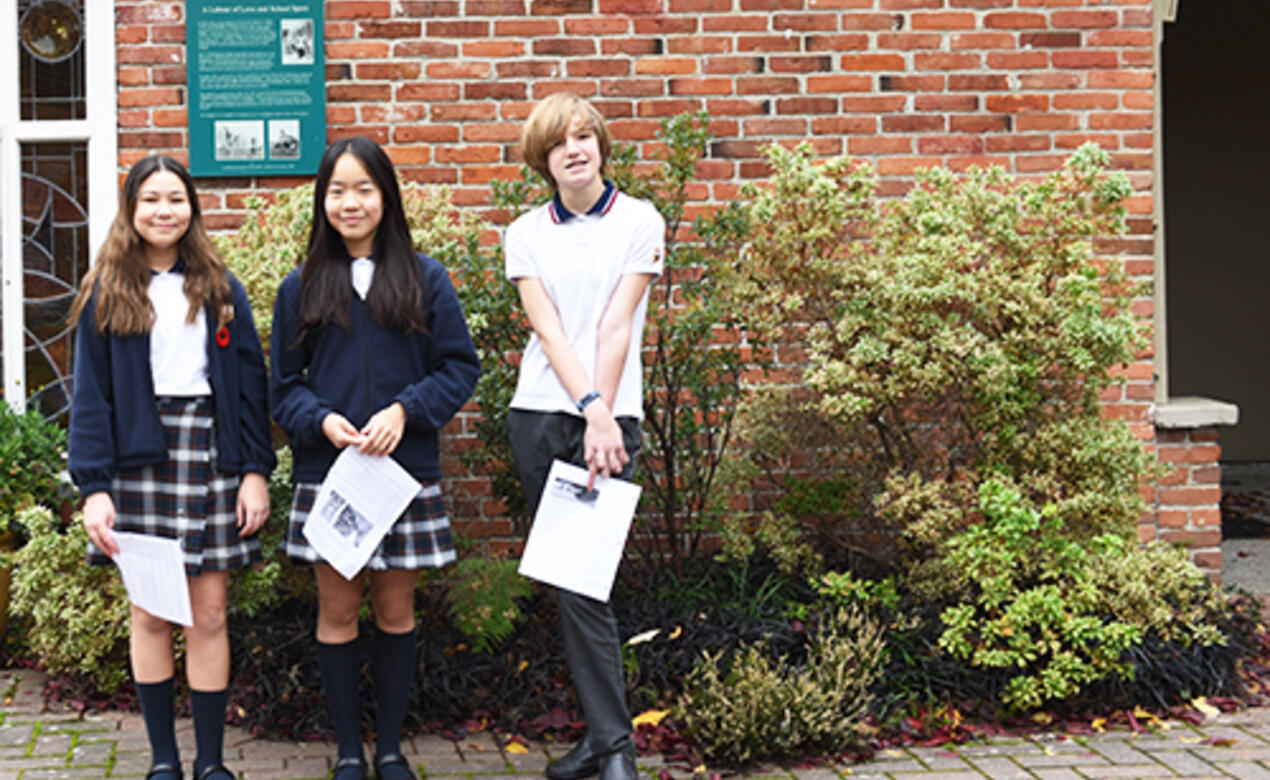
Leading up to Remembrance Day, the Weekly spoke with several members of our SMUS community—from teachers, students, faculty, and more. Here are some of their inspiring and thoughtful insights on ways that we might better reflect, and remember, who we are as a school community, and what our fallen ‘Old Boys’ did for our institution and for our country.
Every year, on Remembrance Day, it is so important that we, as a school, recognize our former student soldiers—whom, by the way, you have beautifully and prominently placed on display in the Snowden Library. Why is it so important that we continue to pay this respect, year after year?
Kirsten Davel, Head of Library Studies and Research, Snowden Library - It is part of our ‘remembrance’ because these men didn’t get to grow old, as we grow old. Some of them didn’t get to have families. Some of them left their families behind, and some were very young when they lost their lives. I think it’s always important to remember those who have made the ultimate sacrifice so that we can enjoy our freedoms and our rights today that we take for granted. Also, when people ask, ‘why are these rights and freedoms so important to you?’ it is because people were willing to give their lives, to shed their blood—on foreign soil—so that we can enjoy what we enjoy today.

As a student, what do you reflect on during Remembrance Day?
Emma S, student, Grade 7 - I feel like it’s important for people to know about Remembrance Day so that the memories and the history will never be forgotten, particularly, among young people … It’s important for youth to know this so that, a) it can never happen again; and b) so that people recognize that this has happened in our history.
Why would an Old Boy actually choose to lie about their age to enable them to enlist in the war?
Brenda Waksel, Archivist in the Wilson Archives - Because they wanted to fight for their country; they thought that it was their duty to go to war to provide a better world for us. One of the founders of University School, Rupert [Captain] Harvey, we read his letter that he wrote to the boys when he went off to war. Well, the boys loved him. He was the cadet leader and you can tell, when you’re researching him, how much they looked up to him; he was very important to those students. So a lot of them went off to war because of him. They wanted to be like him.
Michael Nation, '70; St. Michael's School alum, and a dedicated volunteer in the Wilson Archives - I can add to that: It was also an adventure. So all the St. Michael’s Old Boys, they were old enough to fight in the Second World War, so, my father, for example: They rushed down to the armories on the first day of the war and tried to sign up. It was an enormous adventure, and it was also a duty they felt—because it was an atmosphere, or an ethos, or a time period, where people thought much more about duty to their country than they do now. It was also still the era in which the British Empire existed as a real idea, a physical reality in the world.
SMUS’ Remembrance Day services are a cornerstone of our school community. It enables us all to pause and reflect and give thanks. What are we hoping the students get out of it? How do we want their experiences to be shaped, and how can our programs support that with respect to Remembrance Day at SMUS?
Reagan Daly, Head of Experiential Education, Service and Global Expeditions - What I hope comes out of our Experiential Program work, and our Through Their Eyes project, and how it ties to our Archives and to Remembrance Day is that we see a growing sense of empathy among students—whereby students actually make the connection to our [fallen] Old Boy individuals whom they are researching, and start to see them as individuals, and not just as members of the Honour Roll or Roster. We hope they see them as people much like they are, as Grade 10 students in school. And, to realize that for each one of these 130-plus names that are read aloud in our Remembrance Day services—they were students at the school once, too. They had families, and they had a life at the school that included sports, academics, and relationships. And, also, like our students, they were from all backgrounds, races, genders, sexual orientations, and histories. We realize that students just like us made this sacrifice with their lives.
When we reflect on the word ‘Service,’ it has various meanings and, particularly at SMUS, one of them is about the enlisted ‘service’ of our fallen soldiers of war, and the other form of ‘service’ is one of our core values. What does Service mean for you and for your colleagues at SMUS?
Elisha Gardiner, Senior Houseparent, Timmis House, Service and Community Engagement Coordinator: At the base of it is a desire to build connection. Acts of service are about connection and feeling a sense of belonging with a community—and allowing others to feel that, too; it is reciprocal. Service for me is about being grateful for what we have and stepping up where needed. And, when there is a call to action, we listen, and we respond.



